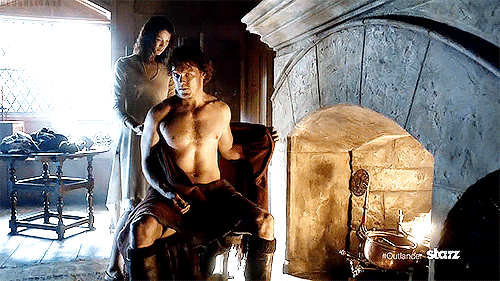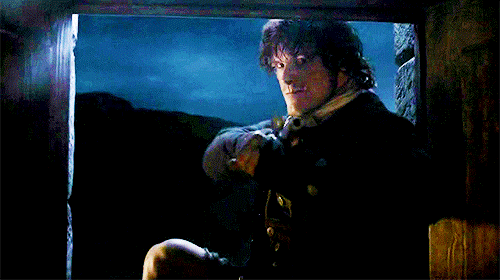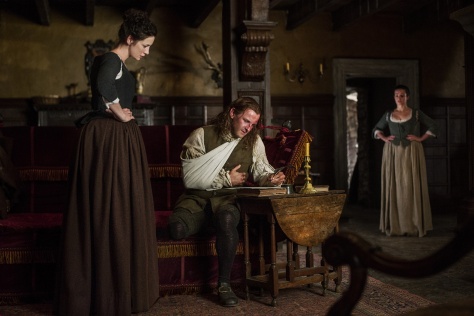“You learn it when you become a doctor…. There are so many there, beyond your reach. So many you can never touch, so many whose essence you can’t find, so many who slip through your fingers. But you can’t think about them. The only thing you can do – the only thing– is to try for the one who’s in front of you…. One at a time, that’s all you can do.”
Diana Gabaldon. Dragonfly in Amber. Chapter 47 “Loose Ends”
“We are not connected with one or two percipient beings, but with a society, a nation, and in some sense with the whole family of mankind.”
William Godwin. Enquiry Concerning Political Justice (1793). II.ii. “Of Justice”
It is not accidental that the heroine of Gabaldon’s Outlander book series is a nurse, a healer, later, a doctor, and a wise woman. For one of the themes that weaves through all the books is that of care: the care of one’s self, of one’s family and loved ones, as well as the care of the community. Claire’s first impulse is always to help those who are hurt, even at the expense of her own safety and comfort. Several times in Outlander, Claire puts herself at risk because of her wish to help others: she tries to save an abandoned baby, believed by the 18th century society to be a changeling;” she rushes to Geillis thinking that Geillis is ill in “By the Prickling of My Thumbs;” and defied Friar Bain when she heals Mrs. FitzGibbons’ nephew from poisoning.
 gemgem1296
gemgem1296
Diana Gabaldon has stated that she has read hundreds of romance novels, but that her books are not like the “modern romance” because they “deal with an ongoing relationship between two decent people who already love each other” and that she does not guarantee “happy endings” (“Genre Labels”). As readers and television viewers have seen in the first book/season, the characters are tested again and again in difficult situations, and Jamie and Claire are never left to just enjoy their life in peace for more than a chapter or a few minutes on screen. Outlander is not an ordinary romance. One reason for the constant battles, with the English redcoats, with Black Jack, with superstitious townspeople, with illness, with jealous lovers, is the need to infuse the plot with excitement and adventures. But what we love about our protagonists is that they rise to the challenges and show themselves to be capable, generous and noble beings.
One way they become heroic is through their ability to care for others and to show selfless love. Early on, Jamie reveals his chivalry by taking the punishment for Laoghaire, Mrs. FitzGibbons’ granddaughter (“Castle Leoch”) when she is charged with loose behavior. Like Claire, Jamie is a man who cares deeply and puts others before himself. He tells Claire that four years ago, he was willing to be whipped by Jack Randall in the hopes of saving his sister Jenny from rape. When he marries, he and his men risk their lives to save Claire from Jack Randall at Fort William (“The Reckoning”), and his ultimate sacrifice is to allow Jack Randall to use his body sexually in exchange for Claire’s freedom (“Wentworth Prison”).

What is interesting about Outlander, however, is that it is not only the main characters who care much for others, who suffer and then triumph, but that there are a host of other characters who are tried and tested. We see many people with injured bodies, with missing limbs, who cannot speak or sing, but who are still able to function and act with goodness. Through this succession of broken bodies, Gabaldon suggests that life often presents us with a series of trials to be endured and overcome. One example is the minor character Hugh Munroe, who appears briefly to give Jamie the name of the English deserter who might clear Jamie’s name. Munroe has an extraordinary story of endurance: captured at sea by the Turks, he was tortured and had hot oil poured on his legs. As a slave in Algiers, his tongue was cut out. Yet in spite of his disabilities, he appears stoic, if not happy, and is able to bestow a gift of the “dragonfly in amber” to the newlyweds. Munroe’s story also reveals the consequences of 18th century imperialism and colonialism. Too often, we hear grand stories of wars and empire, but not the stories of those soldiers who do the fighting, whose lives were irrevocably changed by these wars. Their valor and injuries are not recorded in history books.
Similarly, another character who is injured and disabled is Ian Murray, who lost his leg below the knee in a battle in France. Ian has a wooden leg, but is able to love and be loved by Jenny. His friendship and loyalty to Jamie have not changed and he is capable of running Lallybroch in spite of this physical limitations. Another character, Colum MacKenzie, Jamie’s maternal uncle, suffers from Toulouse-Lautrec Syndrome, a degenerative disease that renders his legs immobile and his body painful. However, he is still able to reign over the MacKenzie clan and rises to the occasion at Gatherings and when needed. These are heartening stories of people who suffer physically, but whose spirit remains unbroken.

Lest we become complacent and think that all these scenes of violence and injury only happened in the 18th century, Gabaldon and Ron D. Moore create parallels to show how we have not learned from history. We are still waging wars that kill and injure, only our weapons are now more sophisticated. In the opening episode set in the Second World War, Claire, clothed in a very bloody apron, is shown in a horrific scene where a soldier’s leg has to be amputated. This amputation scene is later repeated in Episode 6 “The Garrison Commander” where an English soldier has to suffer the same fate. The parallels force us to contend with the way history repeats itself, the way we do not heed the lessons from our past.
Significantly, after the season finale, a number of bloggers wrote about healing and therapy. We, too need comfort after those scenes of suffering at Wentworth. Beth Wesson writes about reader responses and quotes from a fan who commented to Diana Gabaldon that she “expected to be entertained, not healed” by her books. We may not all be able to change the course of history, but like Claire, we can help the person who is right in front of us, one at a time. Bodies may be injured, but spirits do not have to be broken. The end of Outlander gives us hope that there will be a new life ahead for Jamie and Claire.
Discussing happiness, the best use of time, and the advantages of industry, pragmatic and philosophical English author Samuel Johnson wrote: “To strive with difficulties, and to conquer them, is the highest human felicity; the next is, to strive, and deserve to conquer: but he whose life has passed without a contest, and who can boast neither success nor merit, can survey himself only as a useless filler of existence…” (Adventurer 111). Outlander is inspiring because Gabaldon and Ron Moore’s TV production show that real life is not about a couple riding off into the sunset, but a series of day to day trials. Often, we are hurt and suffer loss, but those who endeavor to move on in spite of disheartening encounters, big or small, are the ones who ultimately gain strength and our admiration. Learning from history, we can, like Claire and Jamie, create a caring and supportive community for the real heroes in our lives.
By: Eleanor Ty
Works Cited
Gabaldon, Diana. “Genre Labels and the big ‘romance’ question, are they or aren’t they?” FAQ: About the Books. http://www.dianagabaldon.com/resources/faq/faq-about-the-books/#romancequestion
Johnson, Samuel. “The Pleasures and Advantages of Industry.” Adventurer 111 Tuesday, November 27, 1753. http://www.readbookonline.net/readOnLine/29985/
Wesson, Beth. “I Expected to be Entertained, Not Healed”: Outlander and Reader Response. 9 June 2015. http://bethwesson.com/2015/06/09/i-expected-to-be-entertained-not-healed-outlander-and-reader-response/










Very well said❤️❤️❤️
LikeLiked by 1 person